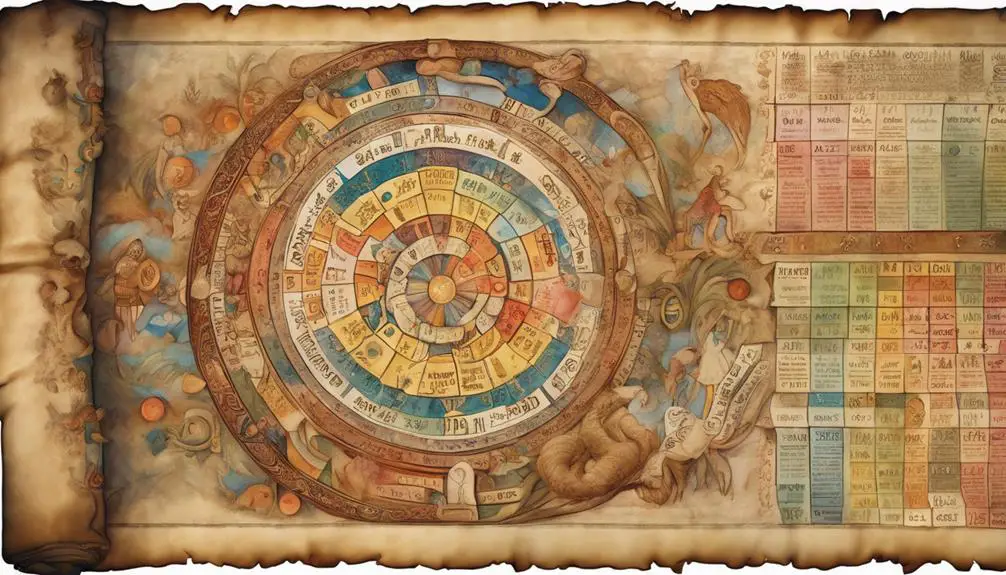Dive into the fascinating exploration of how 'seasons' are uniquely interpreted and defined in the Biblical context.

How Long Is a Season in the Bible
While you may think that the concept of seasons in the Bible is straightforward, it's not as simple as our current four-season model. The Bible, written in a different historical and cultural context, has a unique way of defining and describing seasons.
You'll find that the understanding of a season does not always align with our modern interpretation. So, what does a 'season' actually mean in the Biblical context? Let's embark on this enlightening journey to uncover the true nature of seasons as portrayed in the Bible.
Key Takeaways
- A season in the Bible encapsulates symbolic meanings rather than a specific length of time.
- Biblical seasons correspond with spiritual realities, divine purposes, and significant religious observances.
- The Hebrew calendar, based on lunar months, guides the timing of biblical seasons.
- Understanding biblical seasons requires interpreting their symbolic value tied to spiritual truths and teachings.
Understanding Time in Biblical Context

To fully grasp the concept of a 'season' in the Bible, you must first understand that biblical time isn't perceived the same way as our modern, linear time. The construct of Biblical Timekeeping is considerably different, reflecting an ancient worldview, and is intrinsically tied to the Ancient Jewish Calendar.
While you're accustomed to a calendar that evenly divides the year into 12 months, the Ancient Jewish Calendar was lunar-based, beginning with the new moon. It had 12 or 13 months, depending on lunar cycles, thus creating a year that wasn't a neatly packaged 365 days.
In the Bible, time isn't viewed as a straight line but as a cyclical pattern of seasons, the rhythm of life. This perception of time has more to do with events and their significance rather than the ticking of a clock or the turning of a calendar page. It's about the quality of time, not the quantity.
Understanding this fundamental difference in time perception is crucial before we delve into the biblical concept of 'seasons'. It's not just about how long a season lasts; it's about what happens within that season and the divine purpose it serves.
Biblical References to Seasons

Now that you've grasped the biblical perception of time, let's explore the references to 'seasons' in the Bible, and what they signify in a religious and theological context. The term 'seasons' in the Bible often carries layered meanings.
One of the most striking forms of seasonal symbolism is the Biblical harvests. In the Old Testament, harvests aren't merely agricultural events but are imbued with profound spiritual implications. They're often used metaphorically to represent divine judgment or blessings. For instance, in the Book of Joel, the 'harvest' is symbolically portrayed as a time of judgment where God reaps the nations for their actions.
Conversely, in the New Testament, the harvest is frequently associated with the Kingdom of God and the gathering of souls. In Matthew 9:37, Jesus refers to the 'harvest' as plentiful, but the workers being few, alluding to the vast number of people ready to hear God's word but lacking those to spread it.
Such biblical references to seasons provide a rich tapestry of symbolism, shaping our understanding of God's interaction with humanity and the cyclical nature of divine providence. Thus, seasons in the Bible encapsulate more than just physical changes in climate; they articulate spiritual realities and divine purposes.
The Four Seasons in Scripture

Delving into the four seasons as they appear in scripture, you'll find that winter, spring, summer, and autumn each hold their own unique spiritual significance and insights. The Bible uses these natural shifts in the weather to symbolize shifts in spiritual seasons, providing a rich layer of seasonal symbolism.
- Winter: Often symbolizes a period of spiritual barrenness or dormancy, a time of waiting and preparation (Psalm 74:17). It's the season that prepares the ground for Biblical agriculture.
- Spring: Represents a time of new beginnings and spiritual renewal. The resurrection of Christ occurred in spring, symbolizing new life (Song of Solomon 2:11-12).
- Summer: Symbolizes a period of growth and maturation. It's the time when crops grow to their full potential, echoing spiritual growth (Proverbs 10:5).
- Autumn: This season represents a time of harvest, a period of reaping what's been sown, often used to depict God's judgement (Jeremiah 8:20).
Understanding this symbolism deepens your interpretation of the Bible's teachings, revealing how the natural world mirrors spiritual truths. The cycle of seasons also underscores the importance of patience, trust, and faith in God's timing.
Deciphering the Biblical Calendar

Deciphering the Biblical calendar, a tapestry of timekeeping deeply intertwined with the spiritual seasons, can provide a deeper understanding of the events and teachings in the Holy Scripture. Calendar discrepancies often arise due to differences in the solar and lunar cycles. The Hebrew calendar, based on lunar months, had to be adjusted periodically to keep in sync with the solar year.
The table below provides a brief comparison of the Gregorian (our current calendar) and the Hebrew calendar.
Gregorian Calendar |
Hebrew Calendar |
|---|---|
Solar-based |
Lunar-based |
365 days |
354 days |
12 months |
12 or 13 months |
Diving deeper, each of the Hebrew months was tied to specific religious observances and agricultural cycles, reflecting the deeply spiritual relationship between the people and the land. You'll find that understanding this calendar isn't just about dates and events, but about appreciating the rhythm of life and faith in Biblical times. So, as you navigate through the scriptures, keep the Hebrew months in mind. They'll offer you a richer understanding and a refreshed perspective of the teachings in the Bible.
Case Studies: Seasons in Biblical Events

Examining key Biblical events through the lens of the Hebrew calendar's seasons can shed new light on their significance and timing. Let's delve into the seasonal symbolism and the role of biblical harvests in these events.
- Passover and Spring (Nisan/Abib):
This season is a symbol of new beginnings and life. The Passover, marking Israel's freedom from Egypt, occurred in spring, aligning with the theme of liberation and rebirth.
- Pentecost and Early Summer (Sivan):
Fifty days after Passover, the early summer harvest celebrated at Pentecost signifies abundance and provision, reflecting God's bountiful blessings.
- Day of Atonement and Fall (Tishri):
The autumn season, with the Day of Atonement, signifies reflection, repentance, and renewal, highlighting the need for spiritual cleansing before the final harvest.
- Feast of Tabernacles and Late Harvest (Tishri):
This feast takes place after the final harvest, symbolizing God's complete provision and protection throughout the year.
Frequently Asked Questions
How Did the Bible Influence Our Modern Understanding of Seasons?
The Bible's influence on our modern understanding of seasons is significant.
You can perceive it through the Biblical Calendar's Influence.
It has shaped our concept of time and seasons.
Additionally, Seasonal Symbolism in the Bible provides spiritual significance to each season, deepening our appreciation for them.
It's important to understand that our modern interpretations of seasons owe a lot to these Biblical influences.
Does the Bible Make Any Predictions About Future Changes to the Seasons?
The Bible doesn't specifically predict future changes to seasons. However, it uses seasonal symbolism to express biblical prophecies.
For instance, 'harvest' symbolizes a time of spiritual reaping. But remember, the Bible's focus isn't on climate patterns; it's more about spiritual seasons.
How Does the Bible's Interpretation of Seasons Differ Among Various Christian Denominations?
You'll find that the Bible's interpretation of seasons can vary among Christian denominations. Some view seasonal symbolism as literal, others as metaphorical. The Biblical calendar is also interpreted in diverse ways. These differing views can shape believers' understanding of spiritual seasons, holidays, and prophecies.
It's essential to understand these nuances when studying the Bible and engaging in theological discourse. Always remember, context is key when interpreting Scripture.
How Do Other Religious Texts Compare to the Bible's Depiction of Seasons?
When comparing other religious texts to the Bible's depiction of seasons, you'll find a variety of interpretations. The Quran, for instance, uses seasonal symbolism differently.
In Buddhism, seasons aren't as prominent but still hold significance. It's essential to remember, religious comparisons can be complex due to the cultural and historical contexts of each text.
The Bible's depiction of seasons, therefore, isn't a universal standard but one perspective among many.
Are There Any Significant Biblical Events That Occurred During a Specific Season?
Yes, there are significant biblical events tied to specific seasons. For instance, Christ's resurrection occurred in spring, symbolizing new life. The feeding of the 5,000, a season-related miracle, happened during the barley harvest.
Seasonal symbolism is prominent in the Bible, often linking spiritual truths to natural cycles. Understanding these correlations can deepen your appreciation of biblical narratives and their underlying messages.
Conclusion
In understanding the Bible's seasonal structure, it's crucial to remember the context. The four seasons reflect spiritual truths and the Biblical calendar differs from ours.
Each season lasts about three months, but seasons in Biblical events may have different durations. Look deeper into these patterns to enrich your theological understanding.
As you explore the Bible's notion of time, you'll uncover layers of spiritual insights. This will shed light on the profound ways seasons are used metaphorically in scripture.



Sign up